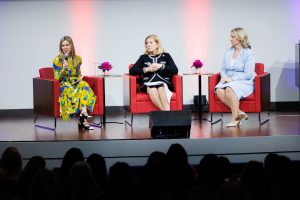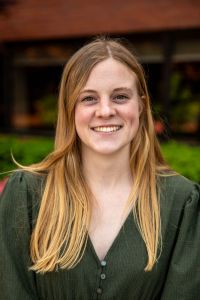Virginia First Lady Suzanne Youngkin Engages With Liberty Students

Virginia First Lady Suzanne Youngkin, along with Virginia’s Secretary of Health and Human Resources Janet Kelly and Secretary of Education Aimee Guidera, discussed current issues with female students at the afternoon Lynchburg Women+girls Gathering March 4 at Liberty University’s Center for Entrepreneurship.
About 20 students were invited to attend the meeting, the majority of which were members of Liberty’s Student Government Association and the LU Women in Business Club. Some residential assistants, student athletes and others in leadership roles were also invited to the gathering. Vickey Costin, Liberty President Dondi Costin’s wife, was among those present.
The roundtable discussion was organized by Liberty’s Office of Government Relations and School of Business.
Faculty Sponsor of the LU Women in Business Club Kristin Boyce, who has attended Youngkin’s past events, was excited for the students to meet and interact with Virginia’s First Lady.
“She’s phenomenal. Just seeing her in the different events, how she engages and interacts and cares, I think the girls will get a feel for that when she’s here,” Boyce said.
The purpose of the meeting was for attendees to consider current issues that affect the general well-being of individuals within the state. The discussion mainly focused on the impact of technology on the younger generation’s mental health.
Kelly said that due to the pandemic and the evolution of algorithms, phones have become increasingly addictive. She then recalled statistics regarding the effects of technology on adolescents.
“We have seen the stats show 57% of teen girls in Virginia report being hopeless or sad. Fifty-nine percent of kids reported being bullied online, 40% of fourth through eighth graders reported being approached by a stranger online, … 95% of kids have been exposed to sexual content online before the age of 18,” Kelly said.

Photo by Matt Reynolds
Youngkin asked Guidera to tell the students what policies have already been put into place as a result of the research concerning those statistics. Guidera spoke about Virginia’s “bell to bell” cellphone-free policy, which came into effect after Virginia Gov. Glenn Youngkin signed Executive Order 33 in July of 2024 to encourage “cellphone free education.” Before the creation and push for that enactment, multiple deliberation sessions were held with parents, teachers and students to find a solution.
Guidera said it was actually students who suggested the phone-free strategy.
“They (students) said, ‘… everybody has rules, but it’s different and nobody’s enforcing them, … so nobody really takes anything seriously. … The best thing you can do is just say, don’t use them,’” Kelly said. “So, it was actually out of listening to the students’ voice. It impacts what we do and how we do it.”
Youngkin then asked the students, who took part in Liberty’s campus-wide digital fast, what observations they had. She also asked what students who didn’t take part in the fast noticed from those who did participate.
Kellie Nichols, a resident assistant, referred to a statistic she learned in a class regarding the current issues in youth ministry.
“The statistic that hit me the most is that … girls who have social media on their phones before the age of 16, and for boys actually the age of 18, are more likely to have a major depressive episode before the age of … 25,” Nichols said.
During the digital fast, Nichols said that girls on her hall became more engaged with their dorm community.
“There was much more laughter and excitement for events coming up,” Nichols said.
Emily DeYoung, a resident assistant, brought up what she’s witnessed in girls during the first couple of weeks of college. She said that girls in her building often came to her in tears because they felt like something was wrong with them; they felt like everyone else had found their group of friends except for them.
DeYoung said the majority of this issue comes from individuals posting on social media.
“Everybody’s trying to amplify, ‘I’m having the best college experience ever,’ and so they’re going to post all about it,” DeYoung said. “… I always tell my girls, ‘Delete social media. … Allow yourself to go through the … transition into college, … but don’t add to that because social media is going to make it so much harder.’”
While Youngkin believes removing social media from daily life is a good idea, she acknowledged how it is difficult to delete something so addictive without replacing it with something else of equal detriment.
“You have to find replacements. To the extent that it helps you all or your friends not feel guilty about the anxiousness that comes with forgoing time online, you have to replace it with something else,” Youngkin said.
Youngkin asked the students what the government or Liberty may be able to do better to continue combatting the pervasive nature of technology. One student suggested that instead of Liberty advertising its events primarily on Instagram, it may be helpful to promote campus events through printed calendars or emails.
Jada Taylor, a graduate student, suggested that instead of treating social media and technology as something horrible, it may be better to consider how to glorify God through using it.
“As believers, I do think that we can have a perspective of, ‘Lord, how do you want me to use this? How can this be a good tool for me? How can I use this for your glory?’ While there are many harms to it and we have to be mindful of those things, I also think it can be so helpful and the Lord can use it in amazing ways,” Taylor said.
Youngkin said that while she and her team will work to find solutions for the concerns brought up during the discussion, she hopes that the individuals who participated in the conversation will be able to impact their communities on their own as well.
“The way we like to think about these gatherings is a little bit like a pebble that you drop in the water. So, even though we’re dropping that little pebble here at Liberty University, we hope that the concentric rings that come out of that impact different communities and different people long after we’ve left,” Youngkin said.
If you would like to get involved with Youngkin’s initiatives, visit firstlady.virginia.gov/womengirls/sisterhood-events.
Sturek is the on-campus news editor for the Liberty Champion.

